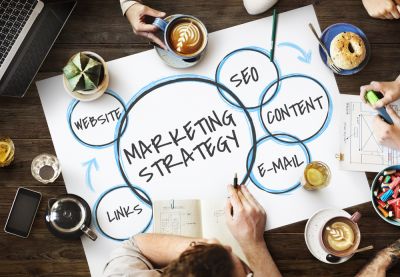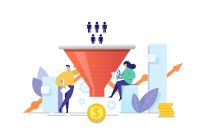Effective marketing strategies help businesses and companies set goals, reach ideal customers, and generate more profits. Measurements can optimise any process, and marketing campaigns are no different. Therefore, if you are responsible for enhancing your company's marketing campaigns, it's essential to give an insight into how to measure the value brought by the marketing strategy. To conduct the most successful campaigns and achieve marketing success, marketers need to recognise what strategies work and what don't intuitively. This is where key performance indicators (KPIs) come in. The following are some typical KPIs you should track:
Marketing Strategy Blog - Marketing - Page 7
Business is a dynamic and ever-changing field. Because they are no longer constrained by geography, they are becoming more diverse. Due to widespread globalisation, we no longer live in a world where you cannot do business with a company located hundreds of kilometres from where you now live. Because of the possibility of interacting with foreign companies or customers, fluency in language and the ability to communicate effectively in writing have become more vital in the modern business world.
Your audience will better comprehend what you're saying, and your brand's reputation for respect, professionalism, and trustworthiness will improve thanks to your words.
TikTok's rapid rise to app popularity seems to have appeared out of nowhere. To begin with, it was a video-sharing app with massive success. So, it's hardly surprising that advertisers have seen the platform's potential. Did you know there are around 100,000,000 unique monthly users of TikTok in the United States alone?
TikTok marketing may benefit brands since there is less regular competition on the site. However, if you're unfamiliar with TikTok, you may need to learn the best ways to promote your business there.
In this post, we'll look at the successful marketing strategies of some of the most popular firms on the video-sharing platform: TikTok.
Our lifestyles in 2023 will drastically differ from anything anybody could have foreseen. As a result, promotion is making a big splash in the cyber realm. Those who had carefully laid out a strategy for their marketing operations based on what they knew at the beginning of that year were forced to abandon ship and start from scratch.
Since technological progress is relentless, it's not surprising that this is where the attention is being directed. The rising digitalization and automation of brand interactions are, however, also meeting resistance. So in today's world, marketers are looking for ways to put the "human" back into marketing.
Have you experienced this? When you post your pictures with short descriptions on social media, only your friends give likes and comments. However, when you write about your annoying experience or funny stories, more people will like and share your post. If you have experienced this, you must know how pivotal storytelling is.
There’s a reason why many companies outsource their marketing right now – they can’t find people with experience. Paying ridiculous salaries for graduates with no experience in the real world of marketing is starting to have an effect with many SME’s opting for more experienced marketing services providers.
What is B2B Advertising?
As the name implies, Business-to-business advertising refers to marketing products or services to other businesses and organizations. It holds several critical distinctions from B2C advertising, oriented toward consumers.
In today's age, digital landscapes have taken over many industries and will continue to rise. The marketing industry is no different, quickly transforming from a low-tech industry to an industry that spends a significant portion of its time and budget on utilising and managing technology.
Life science businesses are growing faster every day. The amount of data being generated is tremendous. It makes it harder and harder to accumulate information without some help; that's why companies have started to embrace cloud-based technologies. Life science businesses are no different.
For online retailers, the last three months of the year are the most crucial. Research shows that this is the quarter in which 57% of shops expect an increase in sales, so now is the time to make the most of it and prevent any unpleasant surprises. The last three months of the year are jam-packed with celebrations and important events. This is your prime opportunity to win over new leads and turn them into lifelong clients.
What exactly is digital transformation, and how does it help your company? If you weren't aware of it, digital transformation is defined as how well organizations can keep up with the rapid expansion of digital technologies and how they adopt them.
A marketing strategy is a company or organisation's long-term plan for achieving the goals they have set.
An excellent marketing strategy is essential for a business to increase sales and gain an advantage over its potential competitors.
The product or service alone will not be able to compete with its competitors unless an effective marketing strategy has been put in place to best influence the consumer.
To ensure success in a marketing plan, a few steps must be utilised. Having a set structure to follow throughout the campaign will guarantee consistent results as all necessary steps are taken to best address your client's needs. In addition, a successful plan will demonstrate a clear understanding of the customer's needs, desires, psychographics, and demographics and outline how your message will captivate these audiences.
If you’re putting a lot of effort into marketing your business, but are failing to see results, you’re not alone. Unfortunately, marketing efforts do not always produce results and many marketing campaigns simply don't hit the mark. Many businesses find themselves wasting time and money using marketing tactics that simply do not work. In the end, it all comes down to the marketing strategy they have developed.
No Money? No Problem! In this post, you'll find many ways to carry out your marketing activities, even if you're tight on your marketing budget.
If you're a business just starting out or a small-sized marketing start-up agency, you may not have the adequate amount to run your marketing plans. However, the good news is that you don't need costly marketing techniques because there are plenty of ways to reach out to your customers without burning a hole in your pocket.
















